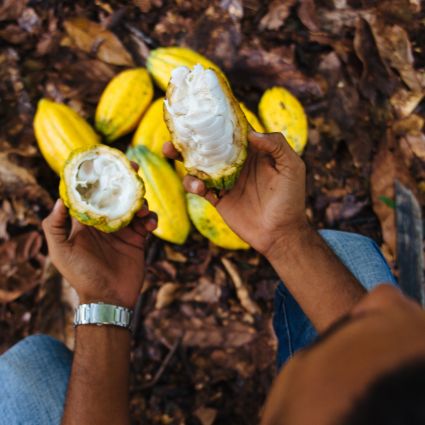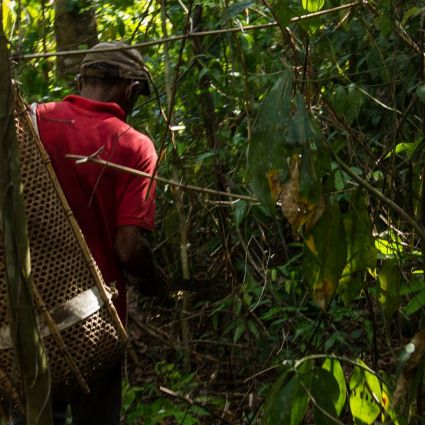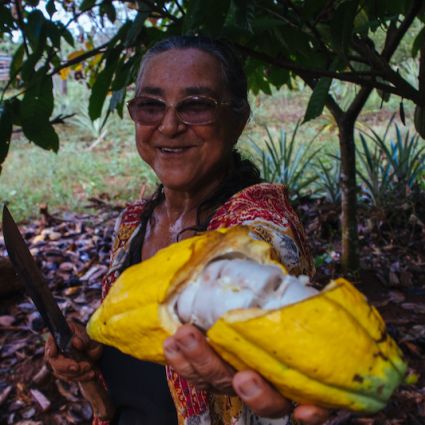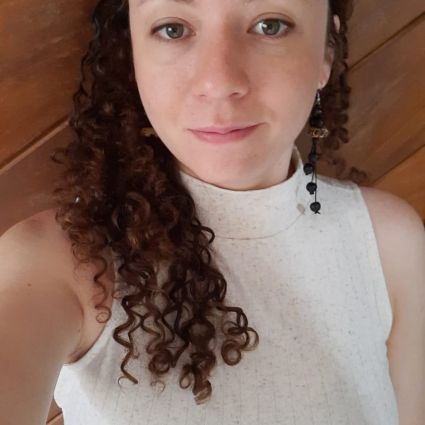Resident in the quilombola community in Arancuan de Baixo, along the banks of Trombetas River, in Oriximiná, Pará State, Andréia Gonçalves Lima is proud of the maniocs and pineapples that are growing in her land. Close to the plantations of fruits and vegetables also grow Cumaru and Ipê trees. The farmer follows the orientation of agriforest systems (SAFs), which combines agricultural and forest species, diversifying the production of the communities and securing food sovereignty.
Andréia is one of the participants of Roça sem Fogo, a line of action of Florestas de Valor, an Imaflora program, sponsored by Petrobras and financed by Fundo Amazônia/BNDES, iCS, Government of Canada and Humanize, developed since 2014 as an alternative to sustainable handling. "The method consists of preparing the land for planting with no need to use fire, but machete, chainsaw or tractor. Using this procedure, capoeira – forest in regeneration -, is cut in smaller pieces to settle organic matter. The decomposition of this matter generates nutrients that aid in the maintenance of the soil, which is proper to be used for a longer period of time", explains the biologist and master in Applied Ecology, Leo Ferreira, Imaflora’s Project Coordinator.
Traditionally, in this region, agriculture is performed according to the slash and burn cycle, explains Ferreira: "The farmers cut down the native vegetation or the capoeira and burn the land to clean the plot, subsequently plant in the area". With the first rains, the land is washed away, deteriorating it, so it is necessary to look for another area for planting, with constant moving around. Roça Sem Fogo can double or even triplicate the time of use of the same agricultural plot.”
Andréia plants manioc, cassava and seedlings of trees such as Cumaru and Ipê provided by the project. She already feels the benefits of the conservation of nature provided by the model. "We liked this system because we don’t need to burn the vegetation. The smoke is bad. So the Project is good for us. No burn. No harm."
Roça sem Fogo is expanding year after year. "Every year new farmers join the initiative. Some years, we can’t meet the demand of more farmers interested", states Ferreira. In total, around 150 families are benefited by Roça sem Fogo in the Sustainable Development Project (Projeto de Desenvolvimento Sustentável – PDS) in Paraíso, a colonization settlement and land reform in the municipality of Alenquer, and also in the lands of Oriximiná quilombadas, both in the region of Calha Norte, Pará State, one of the territories where Florestas de Valor is in action. Since there is still area for expansion in both municipalities, in the next few years these cities will continue being the focus of the project. However, there are support plans for actions in the region of Tapajós River, in the municipalities of Santarém and Belterra. Every year, around 50 to 70 hectares of land embrace Roça sem Fogo, both new areas and also areas where crops have grown for two years in a row. Since its beginning, 170 hectares of land have already been prepared without the use of fire, generating environmental benefits, such as the reduction of risk of forest fires, caused occasionally by uncontrolled fires, and also the reduction of carbon emission, among other gases that cause greenhouse effect, emitted into the atmosphere by burning down vegetation.
Roça sem Fogo and Sistema Agroflorestal (Agrofirest System) promote the diversification of crops, aiding in regeneration and also providing more options of income to farmers. "You need to see how beautiful the manioc is now, the fruits we collect, especially the pineapples", says Andréia. The plantation is still being developed, with seven months for ripening. The objective is to sell them to school meals of the PNAE Program (National School Nutrition Program - Programa Nacional de Alimentação Escolar).
Imaflora is responsible for the subsidy of the utilization of the tractors, work planning of the soil and capacitation. "With proper training, many farmers become multipliers, passing on the technique", says Ferreira. In addition to subsidy and trainings, Florestas de Valor supplies the seedling and seeds, both for production and for green fertilization (plants that gather nutrients and are used as fertilizers in the cultivation).
Florestas de Valor is developed by Imaflora with the sponsorship of Petrobras, through a Socioenvironmental Program of Petrobras. The project received a financial contribution from Aliança pela Amazônia (Amazon Covenant) initiative, through the iCS Institute (Climate and Society Institute), Government of Canada and Humanize. The resources will be used for the expansion of the actions in the PDS Paraíso Project (Sustainable Development Project), with the acquisition of implements for tractors, promoting training workshops and the implementation of the initiative, monitoring technical orientation. "We have already acquired implements for a tractor, which will boost the annual capacity of the implementation", states Ferreira.
About Imaflora
The Institute of Forest and Agricultural Management and Certification (Imaflora) is a non-profit Civil Brazilian Association, created in 1995 under the premise that, the best way for conserve tropical forests is to grant them an economic purpose, associated with proper management practices and responsible management of all natural resources. Imaflora believes that the socioenvironmental certification is one of the tools to address this aspect of the challenge, both in forest and agricultural sectors, with strong power to induce sustainable local development. This way, the aim is to seek to have a positive influence in the productive chains of forest and agricultural products, collaborate in the elaboration and implementation of related public policies, and last but not least, to make a different in the region where it operates, creating usage models of the land and sustainable development that can be replicated in other municipalities, regions and biomes in the country.



